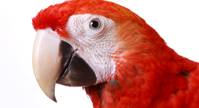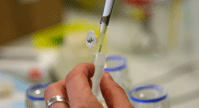Chondrodystrophy (CDDY) & Chondrodysplasia (CDPA) Susceptibility to Intervertebral Disc Disease (IVDD)
Description:
Chondrodysplasia (CDPA) is a general term used to describe a genetic skeletal trait affecting the development of cartilage growth plates. It is generally characterized by a normal sized trunk and shorter than normal limbs.
Chondrodystrophy (CDDY) refers to abnormal cartilage growth and bone development. Many dog breeds like Dachshunds, Bulldogs, Corgis, Pugs, French Bulldogs, Bassett Hounds, Pekineses, Lhasa Apsos, Shih Tzus, Beagles, etc. are defined as having shorter than normal limbs. Other skeletal characteristics that are sometimes associated with chondrodysplasia in dogs are: a lower jaw that may protrude further than normal, an unusually short upper jaw, or over under bite with crooked teeth. Bowed front legs, a crooked spine or breathing problems are also often found to be a problem. In 2009, a discovery found that dogs with CDPA have an autosomal dominant FGF4 insertion on chromosome 18. This promotes the short-legged phenotype. Fibroblast growth factor-4 (FGF4) is a common protein involved in early development on cartilage and bond length. This growth factor is directly correlated to limb development.
In 2017, researchers in the Bannasch Laboratory discovered a second FGF4 insertion on chromosome 12. This insertion is associated with CDDY in dogs with short limbs. It is also associated with the propensity to developmental Intervertebral Disc Disease (IVDD).
Intervertebral Disc Disease (IVDD) is described as premature calcification of the nucleus pulposus. The nucleus pulposus is the inner core of the vertebral disc and is composed of water and a network of collagen fibers. The elastic structure works as a cushion to allow flexibility of the vertebral column. This enables the vertebral column to withstand forces of compression and torsion without damaging the disc. Premature calcification of the nucleus pulposus causes the disc to be less able to adjust to compressions and twists. The nucleus pulposus can then herniate through the protective layer of the annulus fibrosus. It then leaks out of the disc space and inflames the nerve roots next to the disc, causing severe pain and neurological dysfunction or myelopathy. IVDD is a degenerative disease and premature calcification can start in dogs that are less than a year old.
Animal Genetics offers testing for both CDDY and CDPA mutations. The current list of dogs with either CDDY and/or CDPA is not complete and will expand as more testing is completed. CDPA is considered a incomplete-dominant trait, meaning that dogs with 2 copies of the CDPA mutation are smaller than dogs with only 1 copy of the mutation. CDDY is a dominant trait, meaning that dogs only need a single copy to be affected and may be susceptible to IVDD. Dogs that test positive for both CDDY and CDPA have shorter legs. Research is ongoing to determine if dogs that test positive for CDDY and CDPA are more prone to IVDD than dogs that test positive for only CDDY. Testing can help identify dogs with a higher risk for developing IVDD by distinguishing short legged dogs with CDPA from those with CDDY.
Acceptable Sample Types:
Animal Genetics accepts buccal swab, blood samples, and dewclaw samples for testing. Complimentary sample collection kits are available and can be ordered at test now.
CDPA and CDDY variant has been found in following Breeds. Additional breeds may be added over time.
|
|
|
|
|
|
|
|
|
|
|
|
|
|
|
|
|
|
|
|
|
|
Results For CDPA:
Animal Genetics offers DNA testing for Chondrodysplasia (CDPA). The genetic test verifies the presence of the mutation and results as one of the following:
| N/N | Clear | Dog tested negative for the CDPA mutation. |
| N/CDPA | Affected | Dog tested positive for 1 copy of CDPA and will pass on a copy 50% of the time. Dog will be short-legged. |
| CDPA/CDPA | Affected | Dog tested positive for 2 copies of CDPA and will pass on a copy to 100% of the offspring. Dog will be short-legged. |
Results For CDDY:
Animal Genetics offers DNA testing for Chondrodystrophy (CDDY). The genetic test verifies the presence of the mutation and results as one of the following:
| N/N | Clear | Dog tested negative for CDDY mutation. |
| N/CDDY | Affected | Dog tested positive for 1 copy of CDDY and will pass on a copy 50% of the time. Dog will be short-legged and may be at risk for IVDD. |
| CDDY/CDDY | Affected | Dog tested positive for 2 copies of CDPA and will pass on a copy 100% of the time. Dog will be short-legged and may be at risk for IVDD. |
References:
Parker HG, VonHoldt BM, Quignon P, Margulies EH, Shao S, Mosher DS, Spady TC, Elkahloun A, Cargill M, Jones PG, Maslen CL, Acland GM, Sutter NB, Kuroki K, Bustamante CD, Wayne RK, Ostrander EA. 2009. An expressed fgf4 retrogene is associated with breed-defining chondrodysplasia in domestic dogs. Science 325(5943):995-8. doi: 10.1126/science.1173275.
Brown EA, Dickinson PJ, Mansour T, Sturges BK, Aguilar M, Young AE, Korff C, Lind J, Ettinger CL, Varon S, Pollard R, Brown CT, Raudsepp T, & Bannasch DL. (2017) FGF4 retrogene on CFA12 is responsible for chondrodystrophy and intervertebral disc disease in dogs. PNAS 114 (43) 11476-11481. http://m.pnas.org/content/early/2017/10/09/1709082114.
Submit a Sample for Testing:
To submit a sample for testing please go to test now.
To
order a sample collection kit please go to order sample collection kits.
Cost per sample is $45.00. Please see our Canine Fee Schedule for all test rates.










